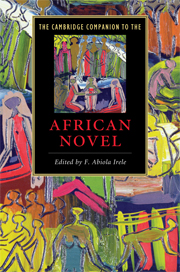Book contents
- Frontmatter
- 1 Introduction: perspectives on the African novel
- 2 The oral-literate interface
- 3 Chinua Achebe and the African novel
- 4 Protest and resistance
- 5 The Afrikaans novel
- 6 The African novel in Arabic
- 7 The francophone novel in North Africa
- 8 The francophone novel in sub-Saharan Africa
- 9 The African historical novel
- 10 Magical realism and the African novel
- 11 The African novel and the feminine condition
- 12 Autobiography and Bildungsroman in African literature
- 13 The postcolonial condition
- 14 New voices, emerging themes
- 15 The critical reception of the African novel
- Bibliography
- Index
8 - The francophone novel in sub-Saharan Africa
Published online by Cambridge University Press: 28 January 2010
- Frontmatter
- 1 Introduction: perspectives on the African novel
- 2 The oral-literate interface
- 3 Chinua Achebe and the African novel
- 4 Protest and resistance
- 5 The Afrikaans novel
- 6 The African novel in Arabic
- 7 The francophone novel in North Africa
- 8 The francophone novel in sub-Saharan Africa
- 9 The African historical novel
- 10 Magical realism and the African novel
- 11 The African novel and the feminine condition
- 12 Autobiography and Bildungsroman in African literature
- 13 The postcolonial condition
- 14 New voices, emerging themes
- 15 The critical reception of the African novel
- Bibliography
- Index
Summary
Sub-Saharan francophone literature has evolved into a distinct area of literary expression and critical study, yielding an impressive body of texts in poetry, drama, and the novel. Starting in the first decades of the twentieth century, texts written in French by African authors have been successively gathered under the rubrics of “black writing,” “Negro-African literature,” “African literature of French expression,” “francophone African fiction,” or “francophone literature,” and, more recently, “postcolonial literatures.” A multiplicity of factors – such as political events, institutional practices, migration movements, literary trends, intellectual exchanges, and individual creativity – has determined the ever-changing contours of the field. While there is no doubt that it is poetry which gave francophone African letters its most famous figure, namely, Negritude poet Léopold Senghor, African francophone literature as we know it today owes much of its solidity to the novelists, who have continuously engaged the novel as a form in order to express the specificities of the African experience at particular moments in history. In so doing, they have created a new literary tradition, characterized by certain topoi and regularities, but also, within the genre itself, by a formidable diversity of voices. What was once thought only in terms of marginality has in turn produced its own canon. First, if we agree with Roland Barthes that a “canon is what is taught,” and if we consider North American syllabi alone, a significant corpus fits this criterion.
- Type
- Chapter
- Information
- The Cambridge Companion to the African Novel , pp. 125 - 140Publisher: Cambridge University PressPrint publication year: 2009
- 3
- Cited by

